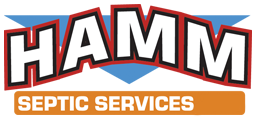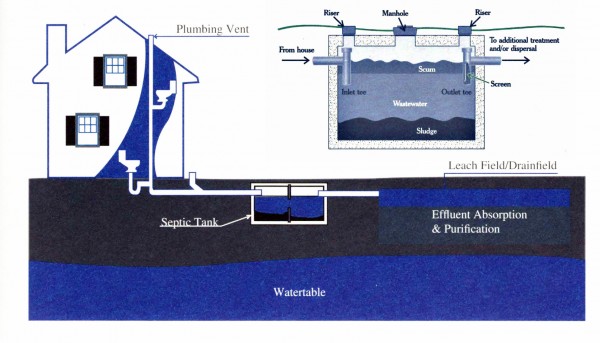How Septic Systems Works
A septic system is designed to condition untreated liquid household waste (sewage) so that it can be readily dispersed and percolated into the subsoil. Percolation through the soil accomplishes much of the final purification of the effluent, including the destruction of disease producing bacteria.
Your septic tank is the first step in the process of sewage conditioning. Without it, the untreated sewage would quickly clog the receiving soil and prevent the purification process of leaching and soil percolation.
Septic tanks serve three functions:
- Removal of solids As sewage enters the septic tank, its rate of flow is reduced so that the larger solids sink to the bottom or rise to the surface. These solids are retained in the tank and the clarified effluent with suspended and dissolved solids is discharged.
- Bacterial action The solids and the liquids in the tank are partially decomposed by bacteria and other natural processes. These bacteria are called anaerobic because they thrive in the absence of free oxygen. This decompostion of sewage under anerobic conditions is termed “septic”, hence the name of the system (and the cause of the odor).
- Sludge & scum storage Sludge is the accumulation of solids at the bottom of the tank, while scum is a partially submerged mat of floating solids that may form at or near the surface. Space must be provided in the tank to store these residues during the intervals between cleaning. Otherwise, the sludge and scum will eventually be drained from the tank and will clog the leachfield and receiving soil. PERIODIC CLEANING OF YOUR TANK IS ESSENTIAL TO ITS PROPER FUNCTION.
Finally, the treated effluent from the septic tank is discharged to the leachfield where it percolates through suitable gravel and finally into the subsoil for further purification.
Flushable wipes are NEVER flushable in septic systems.
Did you know that baby wipes may specify they are flushable, but should never be flushed into your septic system? This also includes adult wipes, cleaning wipes, medical wipes, etc.
In fact, the only paper product that should be “flushed” is toilet paper. It is the only paper designed to break down as it travels through the wastewater treatment process.

